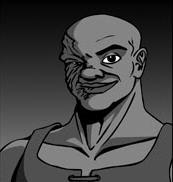Difference between revisions of "Bardolph"
Phoenician (talk | contribs) |
|||
| (20 intermediate revisions by 6 users not shown) | |||
| Line 1: | Line 1: | ||
[[Image:Bardolph.JPG|thumb|200px|Bardolph]] | [[Image:Bardolph.JPG|thumb|200px|Bardolph]] | ||
| − | '''Bardolph''' is a member of [[Falstaff]]'s | + | '''Bardolph''' is a member of [[Falstaff's Gang|Falstaff's gang]]. |
| + | __TOC__ | ||
| + | <br style="clear:both;"/> | ||
| + | ==History== | ||
| + | {{CIT|Bardolph was born in [[Timeline#995-1993|1952]].}} [http://s8.org/gargoyles/askgreg/search.php?qid=12316] He was one of several mercenaries helping [[Falstaff]] to guard the [[Illuminati|Illuminati's]] treasury on [[Eastcheap|Eastcheap Isle]] when it was attacked by the [[Redemption Squad]] in [[Timeline#1997|1997]]. | ||
| + | |||
| + | ==Characteristics== | ||
| + | Bardolf possesses the ability to breathe fire, whether this ability is supernatural in nature or a learned skill is unknown. [http://www.s8.org/gargoyles/askgreg/search.php?qid=12159] His right eye is almost closed over due to scarring. | ||
==Appearances== | ==Appearances== | ||
| − | * | + | * [[Strangled|"Strangled"]] (First Appearance, No Lines) |
| − | * | + | * [[Losers|"Losers"]] (No Lines) |
| − | |||
| − | |||
| − | Bardolph is named after one of Falstaff's associates in [[Shakespeare]] | + | ==Real World Background== |
| + | Bardolph is named after one of Falstaff's associates in [[William Shakespeare|Shakespeare's]] ''Henry IV'' plays (he also appears in ''[[Henry V (play)|Henry V]]'' and ''[[The Merry Wives of Windsor]]''). One of the leading members of the gang, Bardolph is noted for his extremely florid complexion, which Falstaff and the other members of the cast often make jokes about; this is the inspiration for the fire-breathing ability of the Bardolph of ''[[Gargoyles: Bad Guys|Bad Guys]]''. | ||
| − | In ''Henry V'', after Falstaff's death, Bardolph enlists in Henry V's army for the war in France. On the march from Harfleur to Agincourt, Bardolph is caught looting a church and sentenced by the king to be hanged. (This incident comes from the English chronicles, though the identification of the thief as Bardolph is Shakespeare's invention.) | + | In ''Henry V'', after Falstaff's death, Bardolph enlists in Henry V's army for the war in [[France]]. On the march from Harfleur to Agincourt, Bardolph is caught looting a church and sentenced by the king to be hanged. (This incident comes from the English chronicles, though the identification of the thief as Bardolph is Shakespeare's invention.) |
[[Category:Canon characters]] | [[Category:Canon characters]] | ||
[[Category:Humans]] | [[Category:Humans]] | ||
[[Category:Falstaff's Gang]] | [[Category:Falstaff's Gang]] | ||
Latest revision as of 15:47, 23 March 2025
Bardolph is a member of Falstaff's gang.
History
Bardolph was born in 1952. [1] He was one of several mercenaries helping Falstaff to guard the Illuminati's treasury on Eastcheap Isle when it was attacked by the Redemption Squad in 1997.
Characteristics
Bardolf possesses the ability to breathe fire, whether this ability is supernatural in nature or a learned skill is unknown. [2] His right eye is almost closed over due to scarring.
Appearances
- "Strangled" (First Appearance, No Lines)
- "Losers" (No Lines)
Real World Background
Bardolph is named after one of Falstaff's associates in Shakespeare's Henry IV plays (he also appears in Henry V and The Merry Wives of Windsor). One of the leading members of the gang, Bardolph is noted for his extremely florid complexion, which Falstaff and the other members of the cast often make jokes about; this is the inspiration for the fire-breathing ability of the Bardolph of Bad Guys.
In Henry V, after Falstaff's death, Bardolph enlists in Henry V's army for the war in France. On the march from Harfleur to Agincourt, Bardolph is caught looting a church and sentenced by the king to be hanged. (This incident comes from the English chronicles, though the identification of the thief as Bardolph is Shakespeare's invention.)
